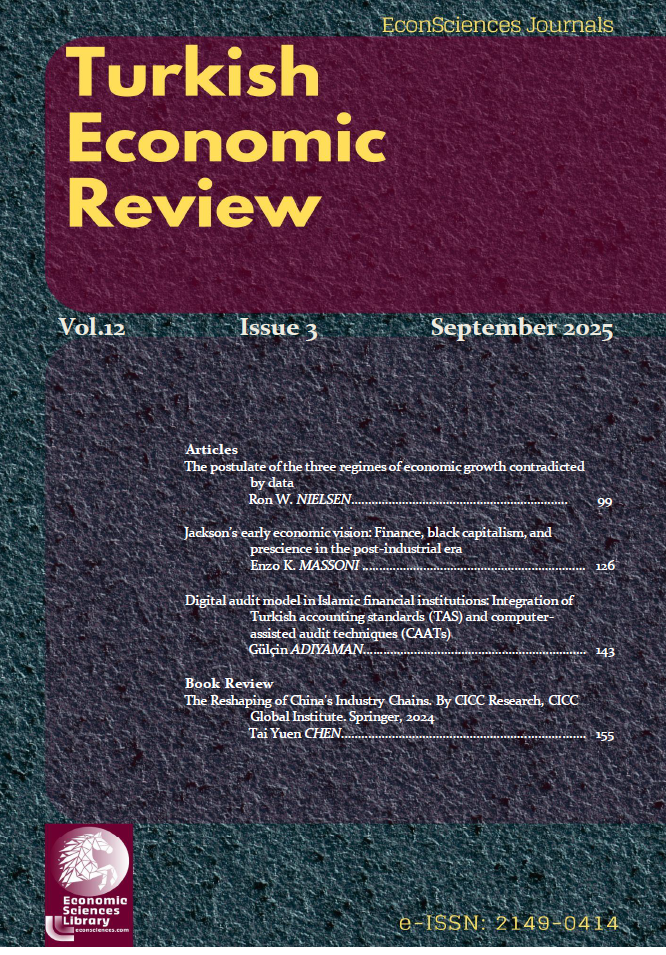Abstract
The rapid digitalization of financial systems has profoundly transformed audit processes, requiring the integration of technological tools with traditional accounting frameworks. This study aims to develop a conceptual digital audit model by integrating Turkish Accounting Standards (TAS) and Computer-Assisted Audit Techniques (CAATs) within the context of Islamic financial institutions. Islamic finance operates under principles of transparency, justice, and Shariah compliance, which necessitate unique approaches to auditing and financial reporting. Within this scope, the study first examines the role of TAS in ensuring standardized, reliable, and ethical reporting for Islamic finance entities. Secondly, it discusses the contribution of CAATs to audit efficiency, fraud detection, and continuous monitoring. Finally, a model framework is proposed that combines both TAS-based compliance and CAATs-driven digital assurance to strengthen audit reliability and Shariah compliance. The study contributes to the literature by offering a technology-supported and ethically grounded digital audit perspective that can enhance accountability, transparency, and stakeholder trust in Islamic finance.
Keywords. Islamic Finance; Turkish Accounting Standards (TAS); Computer-Assisted Audit Techniques (CAATs); Digital Audit; Shariah Compliance.
JEL. G20; M41; M42.
References
AAOIFI. (1991). Accounting, auditing and governance standards for Islamic financial institutions. Accounting and Auditing Organization for Islamic Financial Institutions.
Akdoğan, N., & Sevilengül, O. (2020). Finansal muhasebe: TMS/TFRS’ye göre. Gazi Kitabevi.
Akdoğan, N., & Sevilengül, O. (2020). Türkiye muhasebe standartları ve uygulamaları. Gazi Kitabevi.
Aydın, A., & Güneş, R. (2021). Digital transformation in audit processes of Islamic finance institutions. Journal of Accounting and Auditing Research, 8(2), 45–61. https://doi.org/10.29329/joaar.2021.325.3
Berk, R. A. (2013). Top 20 strategies to increase the online response rates of student rating scales. International Journal of Science in Society, 4(2), 23–36.
Boysen, G. A. (2015a). Preventing bias in student evaluations of teaching: What we can learn from social psychology and marketing research. Teaching of Psychology, 42(1), 11–17. https://doi.org/10.1177/0098628314559405
Boysen, G. A. (2015b). What if student evaluations of teaching are wrong? New Directions for Teaching and Learning, 142, 31–44. https://doi.org/10.1002/tl.20128
Boysen, G. A., Kelly, T. J., Raesly, H. N., & Casner, R. W. (2014). The (mis)interpretation of student evaluations of teaching. Assessment & Evaluation in Higher Education, 39(6), 641–656. https://doi.org/10.1080/02602938.2013.860950
Chapra, M. U. (1992). Islam and the economic challenge. The Islamic Foundation.
Chapra, M. U. (2016). The future of economics: An Islamic perspective. Islamic Foundation.
Demir, B. (2021). Katılım bankacılığında etik denetim ve şeffaflık uygulamaları. Uluslararası İktisadi ve İdari İncelemeler Dergisi, 31(3), 102–118. https://doi.org/10.18092/ulikidince.902672
Demir, T. (2021). Shariah compliance auditing and corporate legitimacy in Islamic banking. Journal of Islamic Economics and Finance, 7(1), 1–20. https://doi.org/10.46222/jief.v7i1.341
Ergül, M. (2023). Dijital dönüşümün muhasebe ve denetim uygulamalarına etkileri. Muhasebe Bilim Dünyası Dergisi, 25(1), 78–99. https://doi.org/10.31460/mbdd.1259021
Ergül, M. (2023). The impact of digital transformation on independent auditing: Evidence from Turkey. Journal of Accounting Science World, 25(1), 78–99. https://doi.org/10.31460/mbdd.1259021
Griffin, B., & Wilson, I. (2014). Student evaluations of teaching: Important considerations of race and gender bias. Assessment & Evaluation in Higher Education, 39(4), 499–512. https://doi.org/10.1080/02602938.2013.823436
Griffin, P. A., & Wright, A. (2021). Digital reporting and the future of audit. Accounting Horizons, 35(4), 67–85. https://doi.org/10.2308/horizons-2020-0145
Janvrin, D., Bierstaker, J., & Lowe, D. J. (2017). An examination of audit information technology use and perceived importance. Accounting Horizons, 31(1), 43–67. https://doi.org/10.2308/acch-51651
Karaca, M. (2020). Faizsiz finans ve İslami bankacılıkta risk paylaşımı. Finansal Araştırmalar ve Çalışmalar Dergisi, 12(4), 221–236. https://doi.org/10.26650/fscd.2020.0039
Kaya, D., & Uyar, A. (2019). The effects of IFRS adoption on financial reporting quality: Evidence from emerging markets. Journal of International Accounting Research, 18(2), 1–25. https://doi.org/10.2308/jiar-52357
KGK (Kamu Gözetimi, Muhasebe ve Denetim Standartları Kurumu). (2023). Türkiye Muhasebe Standartları seti. KGK Yayınları.
KGK (Public Oversight, Accounting and Auditing Standards Authority). (2013–2023). Turkish accounting standards (TAS) communiqués. Retrieved from https://kgk.gov.tr
Khan, A., Rahman, M., & Omar, N. (2023). Integrating computer-assisted auditing techniques (CAATs) in Islamic financial institutions. Journal of Islamic Accounting and Business Research, 14(1), 84–102. https://doi.org/10.1108/JIABR-06-2022-0196
Khan, M., Ahmed, R., & Ali, S. (2023). Digital Shariah auditing: Automating compliance in Islamic finance with analytics. International Journal of Islamic and Middle Eastern Finance and Management, 16(3), 455–474. https://doi.org/10.1108/IMEFM-01-2023-0029
Kim, J. (2024). Stable digital assets and the evolution of financial audit paradigms. Journal of Digital Finance and Governance, 4(1), 23–41. https://doi.org/10.1007/s40820-024-00108-0
Kokina, J., & Davenport, T. (2017). The emergence of artificial intelligence: How automation is changing auditing. Journal of Emerging Technologies in Accounting, 14(1), 115–122. https://doi.org/10.2308/jeta-51821
Mahzan, N., & Lymer, A. (2014). Examining the adoption of computer-assisted audit tools and techniques: Cases from the Malaysian public sector. Managerial Auditing Journal, 29(4), 327–349. https://doi.org/10.1108/MAJ-04-2013-0857
Morrison, R. (2011). Online evaluation: The effects on response rate and reliability. Journal of Teaching and Learning, 8(1), 1–15. https://doi.org/10.22329/jtl.v8i1.2892
Nulty, D. D. (2008). The adequacy of response rates to online and paper surveys: What can be done? Assessment & Evaluation in Higher Education, 33(3), 301–314. https://doi.org/10.1080/02602930701293231
Rahman, N. A., & Omar, M. (2022). Digital auditing and Shariah compliance: Challenges and opportunities in Islamic finance. International Journal of Islamic and Middle Eastern Finance and Management, 15(2), 321–339. https://doi.org/10.1108/IMEFM-08-2021-0371
Rozario, A. M., & Thomas, C. (2019). Reengineering the audit with blockchain and smart contracts. Journal of Emerging Technologies in Accounting, 16(1), 21–35. https://doi.org/10.2308/jeta-52264
Siddiqi, M. N. (1983). Issues in Islamic banking. The Islamic Foundation.
Spooren, P., Brockx, B., & Mortelmans, D. (2013). On the validity of student evaluation of teaching. Review of Educational Research, 83(4), 598–642. https://doi.org/10.3102/0034654313496870
Stowell, J. R., Addison, W. E., & Smith, J. L. (2012). Comparison of online and classroom survey response patterns: Effects on student evaluation of teaching. Computers & Education, 59(2), 611–616. https://doi.org/10.1016/j.compedu.2012.03.014
Sulaiman, M., & Zakaria, N. (2020). Shariah audit and governance in Islamic financial institutions: A comprehensive review. Asian Journal of Accounting Perspectives, 13(1), 17–35. https://doi.org/10.22452/ajap.vol13no1.2
Vasarhelyi, M. A., & Halper, F. B. (1991). The continuous audit of online systems. Auditing: A Journal of Practice & Theory, 10(1), 110–125. https://doi.org/10.2308/aud.1991.10.1.110
Yılmaz, T., & Demir, B. (2022). Finansal raporlama standartlarının uygulanmasında karşılaşılan sorunlar ve çözüm önerileri. Mali Çözüm Dergisi, 162(4), 112–133. https://doi.org/10.33230/malicozum.1065171

This work is licensed under a Creative Commons Attribution-NonCommercial 4.0 International License.
